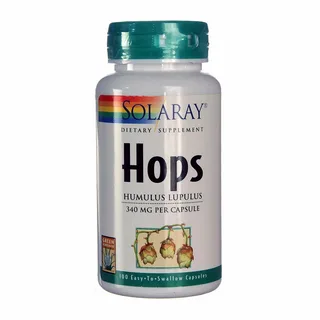Hops, scientifically known as Humulus lupulus, are most widely recognized for their role in brewing beer, where they contribute to the beverage’s distinctive flavor and stability. Beyond their culinary use, hops have a rich history of medicinal applications, dating back to traditional European herbalism for their sedative, anti-inflammatory, and antimicrobial properties. In contemporary wellness practices, hops supplements, available in forms such as capsules, extracts, and teas, are utilized for their potential health benefits, which span from promoting sleep and relaxation to supporting bone health. This comprehensive guide delves into the multifaceted benefits of hops supplements, exploring the scientific basis and clinical evidence supporting their use in modern health and wellness contexts.
Promoting Sleep and Relaxation
One of the most celebrated benefits of hops is their ability to promote sleep and relaxation. The sedative effects of hops are attributed to the compound methylbutenol, which is known to have a calming effect on the brain, facilitating the onset of sleep. Hops are commonly combined with other herbal ingredients like valerian root in supplements designed to improve sleep quality. Clinical studies have supported the efficacy of hops in reducing sleep latency (the time it takes to fall asleep) and improving sleep duration, making it a popular alternative for those seeking natural remedies for insomnia and restlessness.
Anti-inflammatory and Analgesic Properties
Hops exhibit significant anti-inflammatory and analgesic (pain-relieving) properties, attributed to the presence of alpha acids such as humulone and lupulone. These compounds are thought to inhibit pathways involved in inflammation, potentially offering relief from conditions characterized by inflammation and pain, such as arthritis and muscle soreness. While research is ongoing, early studies suggest that hops supplements could serve as complementary treatments for reducing inflammation and associated pain.
Antimicrobial Activity
The bitter compounds in hops, particularly the lupulone and humulone acids, have been shown to possess antimicrobial properties, effective against a range of bacteria and fungi. This antimicrobial activity suggests that hops supplements could support the body’s defense against certain infections. The practical applications of these findings are still under exploration, but they underscore the potential of hops as a natural antimicrobial agent.
Menopausal Symptom Relief
Emerging research indicates that hops may offer relief from menopausal symptoms, including hot flashes and night sweats. This is attributed to the phytoestrogen compounds found in hops, which can mimic the action of estrogen in the body, potentially helping to balance hormone levels and alleviate menopausal discomfort. While the evidence is promising, further studies are needed to fully understand the effectiveness and safety of hops supplements for menopausal symptom management.
Cardiovascular Health
Preliminary studies suggest that hops may have beneficial effects on cardiovascular health. The antioxidant properties of hops can contribute to the protection of blood vessels from oxidative damage, while the anti-inflammatory effects may help reduce the risk of heart disease. Additionally, some research indicates that hops can influence lipid metabolism, potentially lowering the levels of bad cholesterol (LDL) and triglycerides in the blood. These findings point to the potential role of hops supplements in supporting heart health, although more research is needed to confirm these effects.
Bone Health
Hops supplements might also play a role in promoting bone health, thanks to their phytoestrogen content. Phytoestrogens can support bone density by mimicking estrogen, a hormone that plays a key role in maintaining bone mass. This is particularly relevant for postmenopausal women, who are at a higher risk of osteoporosis due to decreased estrogen levels. Research into the specific effects of hops on bone health is still in its early stages, but the available data suggest a promising avenue for further investigation.
Antioxidant Effects
Hops are rich in potent antioxidants, including flavonoids and phenolic acids, which help combat oxidative stress in the body. Oxidative stress is a contributing factor to many chronic diseases, including cancer, heart disease, and neurodegenerative disorders. By neutralizing free radicals, hops supplements can potentially offer a protective effect against these conditions, although direct evidence linking hops supplementation to reduced disease risk is still under research.
Safety and Side Effects
While hops supplements are generally considered safe for most people, they can cause side effects in some cases, especially when taken in large doses. Possible side effects include drowsiness, sedation, and stomach upset. Due to their sedative effects, hops should be used with caution when combined with other sedative medications or alcohol. Furthermore, because of their phytoestrogen content, individuals with hormone-sensitive conditions should consult a healthcare provider before using hops supplements.
Conclusion
Hops supplements offer a range of potential health benefits, from promoting sleep and relaxation to supporting cardiovascular and bone health. Their anti-inflammatory, analgesic, and antimicrobial properties further expand the scope of their use in natural health practices. However, as with any supplement, it’s important to approach the use of hops with an informed perspective, considering the current evidence, potential side effects, and individual health conditions. Future research will undoubtedly continue to uncover the full spectrum of benefits associated with hops supplements, refining our understanding of how these ancient botanicals can contribute to modern health and wellness.

